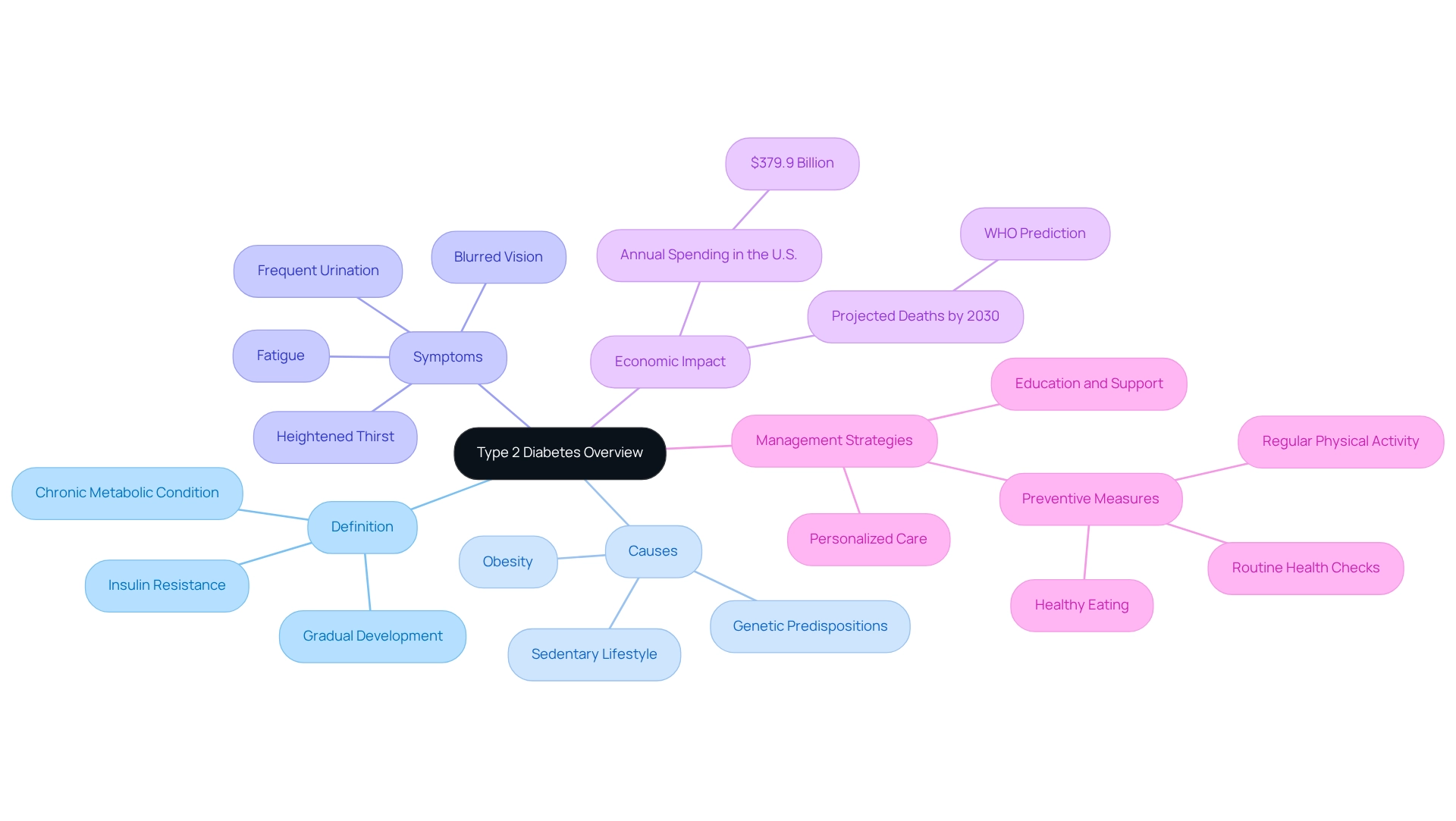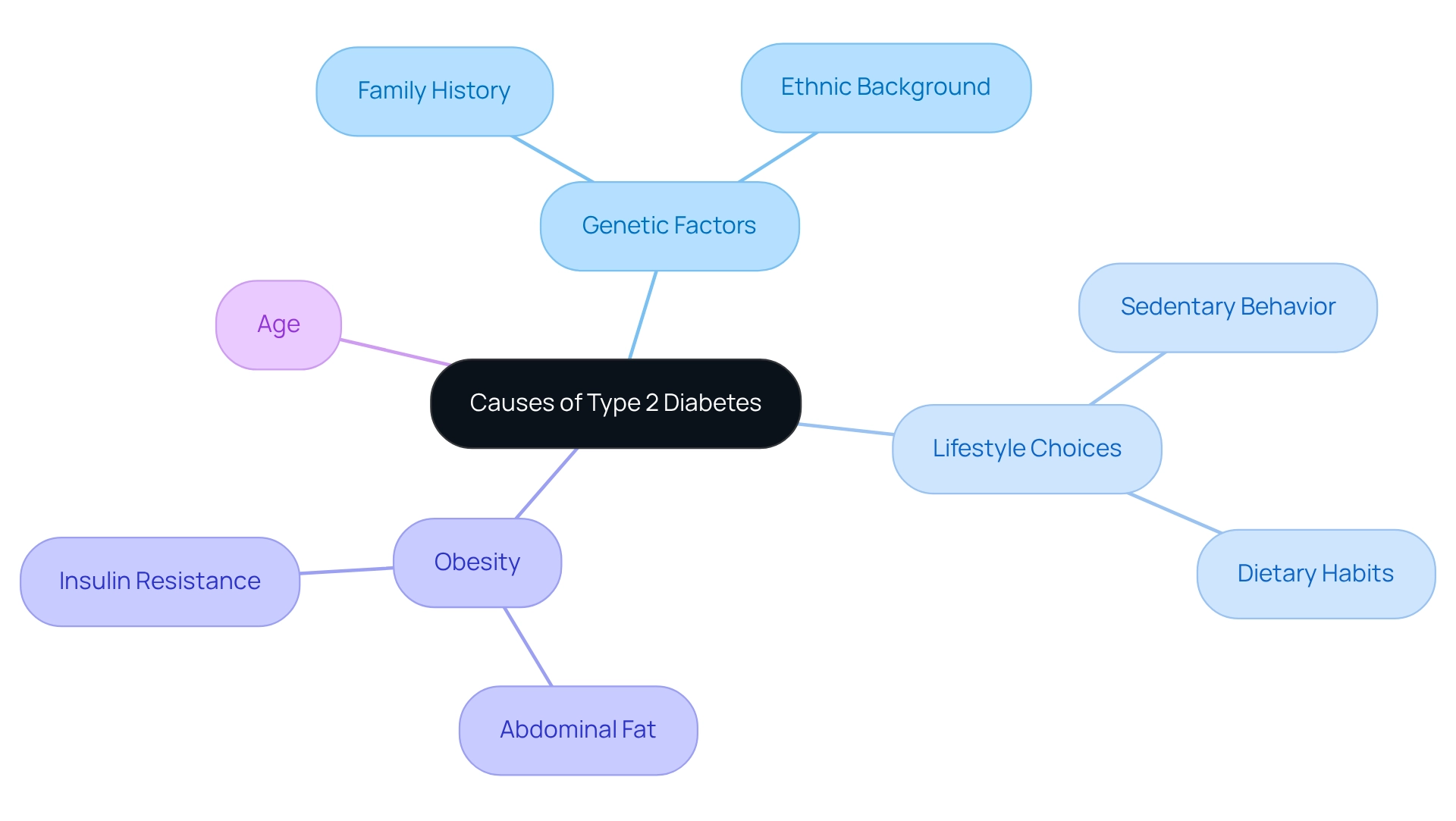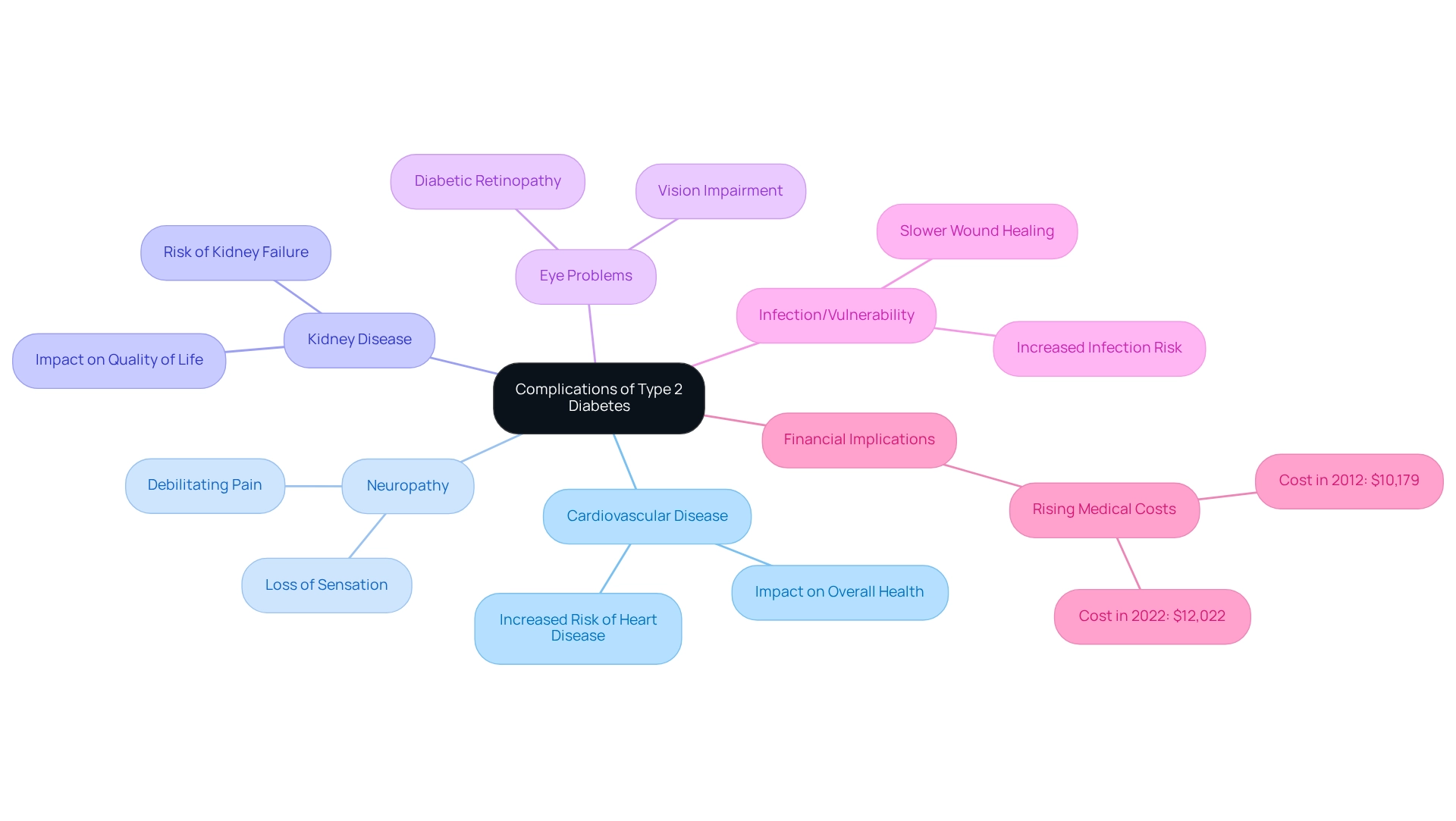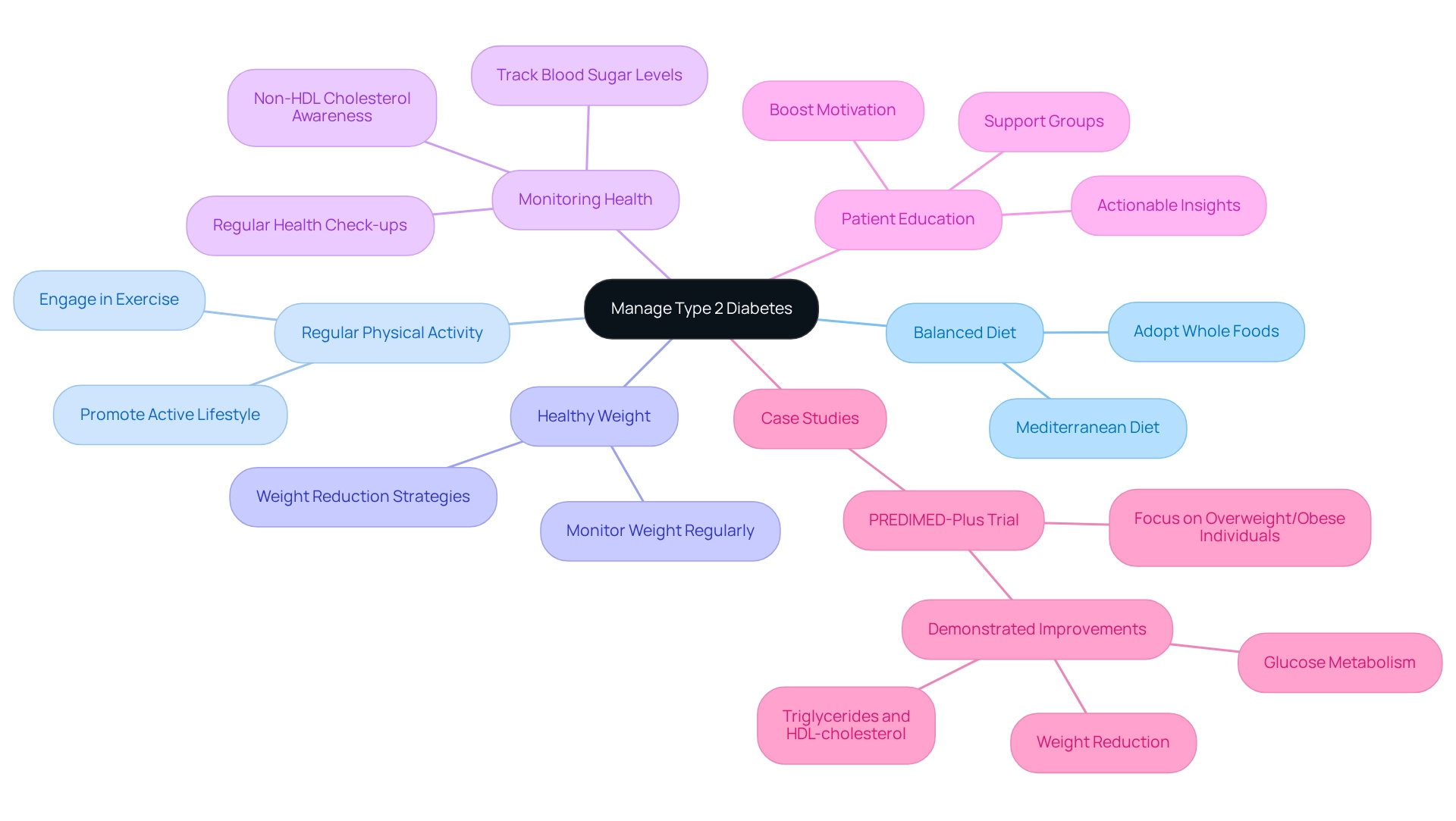Overview
Type 2 diabetes can feel overwhelming, as it is a chronic metabolic condition that leads to elevated blood sugar levels due to insulin resistance and insufficient insulin production. Many people find that this condition is often linked to factors like obesity, sedentary lifestyles, and genetics. It’s important to recognize that you are not alone in this journey.
The article highlights the significance of proactive management strategies. Lifestyle changes and medical interventions can make a real difference in mitigating the serious health complications and economic burdens associated with diabetes. Imagine how effective management can significantly enhance your quality of life.
Have you considered how small changes can lead to big improvements? Embracing healthier habits can be empowering, and it’s never too late to start. Remember, every step you take towards better health is a step in the right direction.
As you navigate this path, know that support is available. Engaging in programs like the 30-Day Diabetes Reset can provide you with the tools and encouragement needed to thrive. Together, we can work towards a healthier future.
Introduction
Type 2 diabetes is more than just a health condition; it’s a growing epidemic that brings significant challenges to individuals and healthcare systems alike. Many people struggle with the realities of this chronic disorder, characterized by insulin resistance and rising blood sugar levels. It’s important to recognize that lifestyle choices and genetic factors play a crucial role in its development. As obesity rates and sedentary habits continue to rise, the urgency for effective management strategies becomes even more pressing.
The staggering healthcare costs and potential complications—ranging from cardiovascular diseases to nerve damage—can be overwhelming. Understanding the intricacies of type 2 diabetes is vital for anyone affected. This exploration delves into the causes, effects, and management techniques that can empower individuals to reclaim their health. By addressing these challenges head-on, we can work together to mitigate the risks associated with this pervasive condition and foster a healthier future.
Define Type 2 Diabetes: An Overview
The definition of diabetes type 2 indicates that it is a chronic metabolic condition that many individuals face, characterized by elevated blood sugar levels resulting from insulin resistance and insufficient insulin production. Unlike Type 1, where the body is unable to generate insulin, the definition of diabetes type 2 explains that those with this condition can produce insulin, yet their bodies struggle to use it effectively. The definition of diabetes type 2 indicates that this condition often develops gradually and is typically linked to factors such as obesity, a sedentary lifestyle, and genetic predispositions.
It’s important to recognize that the impact of Type 2 diabetes extends beyond health, as recent statistics reveal that the U.S. allocates a staggering $379.9 billion annually to diabetes-related healthcare. This underscores the significant economic burden that this condition imposes on individuals and society. The World Health Organization warns that if current trends persist, diabetes-related deaths could double by 2030, highlighting the urgent need for effective management strategies.
Many patients understand that the definition of diabetes type 2 includes symptoms such as heightened thirst, frequent urination, fatigue, and blurred vision, which can greatly affect their everyday life. The underlying causes, as described in the definition of diabetes type 2, are multifaceted, often involving a combination of lifestyle factors and genetic influences. For instance, research shows that preventive strategies like consistent exercise, nutritious diets, and regular check-ups can lower the likelihood of developing Type 2 diabetes by as much as 58%. This illustrates the effectiveness of proactive wellness management in combating the disease.
Real-world examples demonstrate the prevalence of insulin resistance among individuals with Type 2 diabetes, with many facing challenges in controlling their blood sugar levels despite treatment. Current understanding emphasizes the importance of personalized care and education in managing the condition, which is aligned with the definition of diabetes type 2, effectively. By addressing both symptoms and underlying issues, individuals can regain their well-being and enhance their quality of life. Remember, you are not alone in this journey, and there are supportive resources available to help you thrive.
Explore Causes of Type 2 Diabetes
The origins of the second form of this condition can feel overwhelming, as they intertwine various factors, including genetic predisposition and lifestyle choices. One significant risk factor is obesity, especially when it manifests as abdominal fat, which is closely linked to insulin resistance. It’s important to recognize that the rising rates of obesity are mirrored by an increase in the definition of diabetes type 2, which presents a crucial public health challenge.
Many patients find that sedentary behavior and poor dietary habits further exacerbate this risk. Age also plays a pivotal role in susceptibility, making it essential to be mindful of these factors. Furthermore, family history and certain ethnic backgrounds can elevate the likelihood of developing this condition.
Understanding these interconnected causes can empower individuals to identify their risk factors. By taking proactive measures, you can work towards prevention and management. Remember, you are not alone in this journey, and there are steps you can take to lead a healthier life.
Examine Effects and Complications of Type 2 Diabetes
Living with Type 2 conditions, as outlined in the definition of diabetes type 2, can be challenging, and it’s important to recognize that if not effectively managed, they can lead to serious health complications. Among these, cardiovascular diseases are increasingly common among those with high blood sugar. Recent findings show that high blood sugar significantly heightens the risk of heart disease, making it a major contributor to cardiovascular issues.
Many patients find that nerve damage, known as neuropathy, can lead to debilitating pain and loss of sensation. Kidney disease also poses a severe threat to overall health, potentially leading to kidney failure. Eye problems, particularly diabetic retinopathy, can affect vision and quality of life as well.
Furthermore, individuals with uncontrolled blood sugar levels often face increased vulnerability to infections and experience slower wound healing, which can lead to additional complications. Did you know that in 2017-2018, 5,293 children and teenagers aged 10 to 19 were newly identified with Type 2? This emphasizes the urgent need for effective handling strategies concerning the definition of diabetes type 2.
The financial implications can be alarming too; excess medical expenses related to the condition rose from $10,179 in 2012 to $12,022 in 2022. This highlights the economic strain of unmanaged health issues. Experts stress the essential significance of consistent monitoring and proactive oversight to reduce these risks.
By understanding these complications, individuals can appreciate the necessity of taking control of their well-being through informed approaches. Remember, you are not alone in this journey. With the right support and resources, you can make meaningful changes to improve your health and quality of life. Consider exploring the 30-Day Diabetes Reset program to empower yourself on this path to better health.
Manage Type 2 Diabetes: Lifestyle and Treatment Strategies
Managing type 2 conditions can feel overwhelming, but it’s important to know that you’re not alone. A multifaceted approach that combines lifestyle modifications with medical interventions can make a significant difference. Key strategies include:
- Adopting a balanced diet rich in whole foods
- Engaging in regular physical activity
- Maintaining a healthy weight
Did you know that recent statistics show that 8.0% of U.S. adults with this condition have a non-HDL cholesterol level of 190 mg/dL or above? This highlights the importance of thorough health care and monitoring.
It’s essential to keep an eye on blood sugar levels and adhere to prescribed medications, like metformin, when necessary. Patient education plays a vital role in boosting motivation and compliance with treatment plans. Many patients find that support groups provide additional encouragement, fostering a sense of community among those facing similar challenges. For instance, the PREDIMED-Plus trial serves as a real-world example, demonstrating how comprehensive lifestyle interventions, including a Mediterranean diet and exercise, can lead to significant weight reduction and improvements in glucose metabolism and cholesterol levels.
By employing these strategies, you can effectively manage your blood sugar levels and significantly reduce the risk of complications related to type 2. It’s important to recognize that understanding the definition of diabetes type 2 is essential for a proactive approach to lifestyle changes in successful diabetes management. This empowers you to take charge of your health and well-being, paving the way for a brighter future.
Conclusion
Type 2 diabetes is not just a health condition; it represents a significant challenge that many face, and it deserves our immediate attention and care. It arises from a complex interplay of genetic and lifestyle factors, making it essential to understand the condition for effective management. The alarming statistics surrounding healthcare costs and the rising prevalence of complications remind us of the urgency to address this epidemic.
It’s important to recognize that type 2 diabetes is multifaceted, with serious complications stemming from its various causes. Proactive health measures are vital. Lifestyle choices, such as:
- Maintaining a balanced diet
- Engaging in regular physical activity
- Monitoring health indicators
can play a pivotal role in managing this condition. Many patients find that the support and education they receive make a world of difference, reminding them they are not alone on their journey toward better health.
By embracing comprehensive strategies for management and prevention, individuals can significantly improve their quality of life and reduce the risks associated with type 2 diabetes. It is imperative to foster a culture of awareness and action, where informed choices lead to healthier futures. Together, we can turn the tide against this pervasive condition, paving the way for a healthier society. Remember, each step taken—no matter how small—brings us closer to a brighter future.
Frequently Asked Questions
What is Type 2 diabetes?
Type 2 diabetes is a chronic metabolic condition characterized by elevated blood sugar levels due to insulin resistance and insufficient insulin production. Unlike Type 1 diabetes, individuals with Type 2 can produce insulin but struggle to use it effectively.
What are the common causes of Type 2 diabetes?
Common causes of Type 2 diabetes include obesity, a sedentary lifestyle, and genetic predispositions. These factors contribute to the development of the condition over time.
What are the symptoms of Type 2 diabetes?
Symptoms of Type 2 diabetes include heightened thirst, frequent urination, fatigue, and blurred vision. These symptoms can significantly impact everyday life.
How does Type 2 diabetes affect healthcare costs?
The economic burden of Type 2 diabetes is substantial, with the U.S. spending approximately $379.9 billion annually on diabetes-related healthcare.
What preventive strategies can help reduce the risk of developing Type 2 diabetes?
Preventive strategies include consistent exercise, nutritious diets, and regular check-ups, which can lower the likelihood of developing Type 2 diabetes by as much as 58%.
How important is personalized care in managing Type 2 diabetes?
Personalized care and education are crucial in managing Type 2 diabetes effectively. Addressing both symptoms and underlying issues helps individuals regain their well-being and improve their quality of life.
What should individuals do if they are diagnosed with Type 2 diabetes?
Individuals diagnosed with Type 2 diabetes should seek support and resources to help manage their condition, including lifestyle changes and medical guidance.



